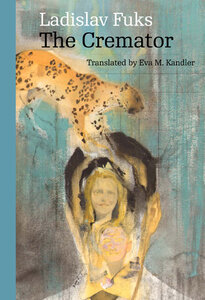My second choice for Czech Lit Month is from 1967 (though it wasn’t translated into English until 2016, by Eva M. Kandler). I understand that Ladislav Fuks (1923-94) often wrote about the period of German occupation, but The Cremator stands out in his work because it focuses on a Czech collaborator.
When we first meet Karel Kopfrkingl he comes across as somewhat odd – for example, he likes to give things and people different names (even insisting on being called Karel when his name is actually Roman) – but essentially decent. He loves his family and believes in compassion for others: “How many people,” he wonders, ”would become good, nice, if there were someone to comprehend them, to understand them, to caress their withered souls a little.”
Kopfrkingl views his work at the crematorium as a noble calling, because it facilitates people’s return to the dust from whence they came, as set out in scripture. He is proud of how rigorously the crematorium keeps to its schedule. But this leads Kopfrkingl to have quite a mechanistic approach to life and death. Couple this with his tendency to parrot whatever opinion he’s been told or reads in the paper, and the circumstances are primed for his slide into collaboration. Kopfrkingl has a friend, Willi, who gradually persuades him to see the Nazis’ point of view – which leads to the darkest of consequences.
What makes this process particularly chilling to read about is how passive it feels. Kopfrkingl doesn’t seem to make a conscious choice – he just drifts that way due to his natural tendencies. The Cremator has an air of unreality (or perhaps heightened reality) that circles back to the all-too-real.
Published by Karolinum Press as part of their Modern Czech Classics series.

Recent Comments